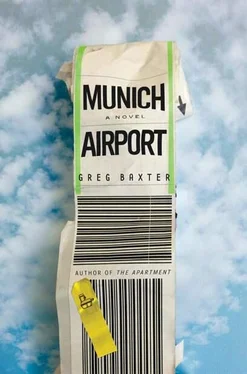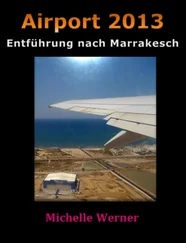I entered Miriam’s apartment, and for the first ten or fifteen minutes I sat at the dining table and did nothing. I drank my coffee, that was all. The room was bright. I didn’t really know where to begin. I left the front door open. I was sort of hoping somebody might walk by and stick a head in. When my coffee was finished, I turned on a small silver radio and tuned it to a classical station. They were playing movie soundtracks. I kept searching. I found NPR in English and listened for a while — the conversation was insipid. So I found some pop trash that could not be accused of being good or bad, it was just fundamentally catchy, then I found a station in Russian. They were playing very strange stuff, so I left it on that. Then I went into the kitchen and checked under the sink. There were trash bags and cleaning supplies and yellow rubber gloves. I put the gloves on. I opened the window in the kitchen, then I opened the windows in the sitting room. The front door promptly slammed shut. I went into the bedroom and grabbed a few large, heavy books. I used them to keep the front door open. Then I divided the apartment into cells and gave each cell a category — books, kitchen stuff, papers, electrical appliances, furniture, and so on. Slowly, I moved everything into these cells. Slowly, I emptied the wardrobe of clothes, a sideboard of DVDs and tablecloths and place mats and glasses, and a drinks cabinet of mostly full bottles of spirits. This is when I first started to pay close attention to Miriam’s possessions. I was so focused on the small things that I did not even notice how nice the large pieces were. They were not heavy, and when they were empty, I moved them easily. Only the couch was heavy. I did not want to scrape the floor, so I had to move it inch by inch, now this end, now that, then I stood it on its end to maximize the space. Then I got some trash bags from the kitchen and put stuff that was obviously trash into them. Then I beat all the dust out of the cushions. Then I swept the dust around the floor. Then I wiped clean all the surfaces. Then I cleaned the windows. Even though the day was cold, and even though a steady frigid breeze was moving through the apartment, and even though I worked slowly and took a lot of breaks, by the time I was done I felt overheated, sweaty, and covered in dust. I wanted a long hot shower. But then I went into the bathroom and realized I couldn’t use it until I cleaned it. At the level of close inspection, it was extremely unclean, and the tiles needed to be scrubbed. I decided, because I did not want to get my clothes dirty, and I did not want to sweat or stink in them anymore, to close the front door and get undressed, completely, except for the yellow gloves, and clean the bathroom thoroughly. It took a while, and I threw up several times, but finally it was sparkling and smelled like lemon and bleach. Then I took the long hot shower. Miriam’s shower was a lot better than the hotel shower. It was better than my electric shower in London. It had one of those tropical-rain showerheads, and it had great pressure. She also had a lot of shower gels. When I was finished, I dried myself off with one of her towels, then threw the towel and everything else from the bathroom into trash bags. Then I got dressed, back into my dusty and slightly damp-from-sweat clothes, and realized it was already past lunchtime. I took the croissant out of its bag and decided it wasn’t going to be enough. I closed the windows, turned off the radio, and put my coat on. I would go through the piles of things after lunch, I decided.
When I opened the door, I found a man standing in the hallway, and we gave each other a fright. Then he stiffened up and rolled his shoulders back, as though he had not been frightened at all. He was slight and thin and had black hair. He wore a black leather motorcycle jacket over a T-shirt, jeans, and boots. He looked past me, he didn’t seem at all happy.
Hello, I said.
Can I help you? he asked.
I don’t know, I said.
Who are you?
I’m the brother.
What are you doing?
I’m going for lunch, I said.
I mean, he said, what are you doing with Miriam’s stuff?
I turned around and looked at the apartment, now compartmentalized like a storehouse, and I wasn’t sure I knew what I was doing.
Who are you? I asked.
I live upstairs, he said.
You knew Miriam? I asked.
Yes, she was a friend.
I closed the door behind me and locked it and said, You have thirty minutes for some lunch?
The man’s name was Otis. He was from New York, but his accent was as corrupted and neutralized from living in Berlin as mine was from living in London.
You’re cleaning, he said.
No, not really.
You’re throwing stuff out.
No, not that, either.
Those books, he said. They…
I could see he felt we ought to be standing in each other’s places. He wanted something, and he didn’t feel he needed to weigh my pleasure or displeasure with the manner in which he expressed himself. He was the friend, and I was the intruder. Let’s talk about the books at lunch, I said. He wasn’t hungry, he said, but he would come along and watch me eat. We walked out of the building and turned toward the square. Otis walked with his hands in his pockets, even when he smoked he walked with his hands in his pockets. He didn’t say much. I spoke, and he mumbled. I tried to be friendly, because I wanted him to warm up, relax, and tell me something about Miriam, even something he might think I wouldn’t want to hear. I told him I lived in London, had lived there for twenty-five years. I told him my father and I were in Berlin to take Miriam’s body home and bury her. I told him where we were staying, and about the close quarters, and my green bathroom, I may have mentioned the botched phone call home from Bedford Square, or the lunch I had afterward, and what the Frenchman had said about the English. Nothing interested him enough to cause him to respond. So I asked Otis if Miriam had said anything about either of us, my father or me. Just the usual, he said. I said, I saw her twice in the last decade, have you known her that long? He said, I have. The day was going gray, and the sunlight was thinning, and the air took on the scent of ice, and I was certain I could see snow.
Are you in contact with anyone who knew Miriam?
Not regular contact, no.
Could you make contact with them, if you had to?
Why?
I wasn’t sure what I was proposing. I think I had in mind a small gathering, something that my father could attend. I didn’t want to make a speech, nor did I want to hear my father make a speech, but I would have liked to see the faces of the people who knew Miriam once. I didn’t think it would remedy my grief, in fact I was sure those faces would populate my nightmares for the rest of my life. Nevertheless I wanted to see them, and I wanted my father to see them. Trish wasn’t getting any information from the coroner’s office, which suggested we’d be in Berlin for another few days at least. If it had to be canceled, so be it, but in the meantime it would give me something to anticipate.
I said, I’d like to just invite anybody who knew her to a casual drink.
He had stopped abruptly on the road. What do you want to eat? he asked. I don’t know, I said, something nice. He said, I’m not sure anything around here would suit you. He was being sincere, and he looked at me an extra half second after he spoke. We were, at that moment, surrounded on all sides by restaurants, cafés, takeouts. I’m not fussy, I said, really. I could see that Otis had no real interest in my fussiness or unfussiness. What was really going on, possibly, with this strange and severe taciturnity, was that he was treating me in the way that he felt Miriam would want him to treat me. If that was the case, then whatever she had said about me, or however she’d behaved whenever she mentioned me, had caused Otis’s behavior. I think I grew teary-eyed. But I didn’t quite accept it. I turned around, this way and that, to look for a place where I might like to eat. It was such an ugly street. It was such a cold, miserable day.
Читать дальше











